WAGNER ROADMAP: A MULTISECTOR APPROACH TO FIGHT THE GROUP
While the US, the European Union, ECOWAS, and a variety of other states and international organizations have tried to respond to Wagner, these attempts have been reactive, struggling to limit the group’s expansion or its numerous human rights abuses.
This paper provides ten potential responses, avenues, or ways of thinking about Wagner Group and other Russian-backed PMCs that can be turned into a roadmap to effectively combat the group.
The sanctions discussion needs to be expanded, as such designations should aim to shame Wagner’s state partners. Potential Wagner partners should be informed of the outcomes of associating with the group— long-term instability and greater distrust in governance. Immediate examples include Burkina Faso, Liberia, DRC, and Sierra Leone.
Further, the Wagner Group has become very shrewd in sanctions-proofing its activities, as can be seen through its economic pipeline from Douala to Bangui. Third-party states should be warned against allowing Wagner Group arms, industrial equipment, or other elements from transiting across their borders. Wagner’s TCO designation may have helped deter some states in this regard, but more work is needed.
Sanctions lists should expand to include actors in third-party countries, such as Broker Expert LLC71, a Russian-owned company widely reported to be shipping heavy machinery to support Wagner Group forestry activities in CAR, and First Industrial Company72, a business owned by Wagner operator Dimitri Sytyi which concocts cheap “Russian” alcohol in Cameroon and sells it in CAR. Governments must stay vigilant, updating sanctions lists routinely to account for shell corporations, new business ventures, and other avenues that the Wagner Group and other Russian entities use to evade sanctions.
Perhaps one of the more important lessons for countering Wagner and other Russian PMCs is the importance of multilateralism. Given Wagner’s ability to entice clients into partnerships via coalescence of false promises and disinformation, efforts to counter the group’s activity demand a strong coalition.
FOREIGN POLICY RESEARCH INSTITUTE 16
Perhaps one of the more important lessons for countering Wagner and other Russian PMCs is the importance of multilateralism.
Regional institutions can play an important role in this regard. For instance, ECOWAS originally sanctioned and 73suspended Mali in January 2022 for its failure to adhere to its promised election timeline and has since eased74 some of those sanctions after the Malian junta's commitment to a 24-month75 transition to democracy. Yet, it is questionable whether the junta will honor the proposed timeline given its track record76 in the past. If the government’s partnership with Wagner is any indication, a partnership that has led to severe human rights abuses and direct targeting of civilians77, then ECOWAS should consider redeploying a robust sanctions package against Mali. It would also be wise to remind Bamako that its confrontational relationship with its neighbors and toward the West is a risky gamble78 as Russia is in no position to provide Mali with the tools it needs to cultivate a durable regime or generate any lasting security. Such actions could play an important role in convincing Mali’s neighbor, Burkina Faso, that Wagner is the wrong partner of choice.
NATO must also continue to consider proactive tools to counter Russian and other PMCs. Moscow’s use of gray-zone tactics via the employment of mercenary outfits like Wagner has frustrated the alliance, and finding effective responses to nontraditional tactics has always been difficult. Given that such hybrid warfare tactics are increasingly the norm, NATO must consider non-kinetic tools that can pack a punch in slowing Wagner’s, and future Russian PMCs’, metastasization.
Though appearing mundane, NATO should work to amplify efforts to push the adoption of the 2008 Montreux Document79—an international agreement designed to reaffirm the legal obligations of states where PMCs originate and for those who hire them. The Montreux Document currently has the support80 of 58 states, including nearly all NATO members. NATO, the EU, and the Organization for Security and Cooperation in Europe have also invoked their support for the document. While the likelihood of convincing a state like Russia to commit to an agreement that seriously hampers their ability to use PMCs to operate in legal limbo and avail them of accountability, NATO and its members have an opportunity to push for its global acceptance81 which would seriously restrict the list of potential Wagner clients. In other words, the more states committed to enhancing rules-based norms about PMCs, the more difficult it will be for Wagner and other Russian PMCs to find business and operate with impunity.
The Wagner Group and other Russian PMCs require consideration within a larger great power discussion, particularly as Russia’s invasion of Ukraine has firmly aligned Europe and the US against Russia. Indeed,
THE WAGNER GROUP’S EXPANDING GLOBAL FOOTPRINT 17
NATO must consider non-kinetic tools that can pack a punch in slowing Wagner’s, and future Russian PMCs’, metastasization.
the war in Ukraine is a cautionary tale but also a welcome precedent. Countries across the globe and particularly in Africa need help building defense and civil society responses to pro-authoritarian, particularly Russian, actors. On the kinetic side, the war in Ukraine demonstrates that the West has the means to provide massive military assistance, including arms, equipment, and training to partners in need. At the same time, these tools must not be used haphazardly, leaving a Cold War-like residue of authoritarianism. The West needs to continue corruption-proofing and authoritarian-proofing its “soft” tools in helping to build strong civil societies alongside militaries capable of maintaining a just rule of law.
warriors are from Africans. Western responses should be a stark reminder of the sobering reality—Wagner is a farce and bad for African security and stability. Its high rate of civilian killings in the places it operates, its failure in Mozambique83 and subsequent exit, and its contribution to weak governance across Africa are all areas that should be directly and iteratively communicated to would-be Wagner clients. Such responses, in turn, can act as a deterrent against future Russian PMC operations.
In the information and media space, Russian-backed sources of disinformation have been on the offensive, with cartoons and other media messaging tools used to sow discord against the West and glamorize the Wagner Group’s interventions in Africa. Western responses must not stoop to this level. Such cartoons are deeply infantilizing82 to target populations, demonstrating how disconnected Russia’s misinformation
On the US side, senior leaders should demonstrate a greater diplomatic commitment to African allies and put pressure on other African leaders considering, or currently contracting, the Wagner Group and other Russian PMC operations. CIA Director William Burns’84 visit to Libya and Egypt and Secretary of State Antony Blinken’s85 visit to Egypt, both in January 2023, provided a good start, particularly given the countries’ proximity to Wagner operations in Sudan and Mali. Vice President Kamala Harris’s visit to Ghana and Secretary Blinken’s visit to Niger are important steps forward. However, subSaharan Africa requires more visits, given the region’s high and increasing rate86 of jihadism on the continent and threats posed by Wagner Group. Cabinet or secretarylevel officials need to double down on the US strategic commitment to Africa with individual visits in Côte d’Ivoire, Liberia, Senegal, and Sierra Leone. Like Burns’ and Blinken’s visits, these meetings must highlight the dangers of doing business with Wagner Group and other Russian PMCs.
FOREIGN POLICY RESEARCH INSTITUTE 18
Western responses should be a stark reminder of the sobering reality—Wagner is a farce and bad for African security and stability.
Beyond warning states about Wagner, these diplomats should also extend an olive branch on security sector reform and assistance alongside NATO and the US. A proactive approach will prevent US leaders from having to offer security guarantees ex post facto after Wagner Group has already destabilized states and influenced governments, as recently occurred in CAR87
instability. Given the rise of jihadism and insurgency across the continent, now is the time for African leaders to take the lead in guaranteeing regional and continental security. Peacekeeping efforts have already begun among EAC members in the battleridden North Kivu province of DRC where Kenyan peacekeepers arrived in December 2022. Perhaps similar African peacekeeping strategies can be applied elsewhere on the continent—with the caveat that multilateral African approval ought to apply before individual peacekeeping interventions to prevent states from masking aggression as peacekeeping.
“African solutions to African problems”—the idea of an autonomous Africa—presented by the late Ghanaian economist George Ayyitey when describing the Somalia crisis, is a much-debated and key element in the ever-changing debate on international security in Africa. While many argue for noninterventionism88 as a defining doctrine of post-colonial Africa, the continent’s history89 would suggest otherwise. Perhaps the continent should reevaluate this discussion at a time when former colonial military support is waning90, at the behest of many African leaders. International bodies such as the African Union, ECOWAS, and the East African Community (EAC) should reevaluate their approaches to peacekeeping and
Exploiting the friction between Wagner’s financier and the MoD should also be considered a worthwhile policy option. As noted, Wagner and PMCs like it are only semi-autonomous. They cannot function without the approval or support of the Kremlin and the military. Therefore, opportunities to exploit deteriorating relations between Prigozhin and the Russian General Staff can have tremendous payoffs. US Treasury’s layered sanctions91 approach aimed at constricting Wagner’s financial capabilities is one way to frustrate the group in this regard, making it a far less appealing tool both now and in the future. Moreover, amplifying the narrative of problems between Prigozhin and the Russian military may have a deterrent effect as potential clients worry about Wagner’s ability to service a contract. However, such an approach has limitations. For starters, Prigozhin certainly does not need any help in straining relations with the Russian MoD, and at least for now, this does not appear to
THE WAGNER GROUP’S EXPANDING GLOBAL FOOTPRINT 19
International bodies such as the African Union, ECOWAS, and the East African Community (EAC) should reevaluate their approaches to peacekeeping and instability.
have soured his contracts elsewhere. More importantly, however, his mercenary outfit is not the only one that the international community will have to deal with now, or in the future. Therefore, exploiting current friction is only a short-term solution.
NATO members must formalize methods of blocking contact with the Wagner Group through their international activities.
Last, NATO members must formalize methods of blocking contact with the Wagner Group through their international activities. France’s subtle political support for Khalifa Heftar92 in Libya would have briefly aligned France with Wagner Group93, particularly in Heftar’s April 2019 offensives. Although France has since disavowed Heftar94 and any potential connections with Wagner in Libya, NATO members must avoid becoming strange bedfellows with Wagner Group in the future. To this end, NATO members should adopt best practices that prevent accidental friendly contact with Wagner Group—perhaps members can draw on US Leahy Law95, which prevents the US government from providing military assistance to individuals with a history of human rights abuses, or similar European practices.
The Wagner Group is the centerpiece of this article, and we argue that the Group must be countered quickly and effectively to stop its contagion effect across the continent. Still, it is surely not the only discussion point on African security policy and counterinsurgency. The group’s commitment to humanitarian violations and its degradation of the long-term rule of law are worrying, particularly from a US perspective, but Wagner must be addressed within a greater strategy that considers security and good governance across Africa. PMC and mercenary groups like Wagner are neither new nor revolutionary concepts in Africa; however, their recent expansion into the political and economic life of African countries are particularly troubling trends. While Wagner Group needs to be addressed immediately, mercenary activities are a symptom of a greater failure in counterinsurgency and governance that must be addressed through long-term change by building civil society institutions and supporting free and fair governance.
FOREIGN POLICY RESEARCH INSTITUTE 20
1 Catrina Doxsee, “Putin’s Proxies: Examining Russia’s Use of Private Military Companies,” Congressional Testimony, House Oversight and Reform National Security Subcommittee, September 15, 2022, https:// www.csis.org/analysis/putins-proxies-examining-russias-use-private-military-companies
2 Raphael Parens, “The Wagner Group's Playbook in Africa: Mali,” Foreign Policy Research Institute, March 18, 2022, https://www.fpri.org/article/2022/03/the-wagner-groups-playbook-in-africa-mali/
3 Christopher Faulkner, “Undermining Democracy and Exploiting Clients: The Wagner Group’s Nefarious Activities in Africa,” CTC Sentinel, Combating Terrorism Center at West Point, Vol. 15, Issue 6, June 2022, https://ctc.westpoint.edu/wp-content/uploads/2022/06/CTC-SENTINEL-062022.pdf
4 Silvia D'Amato, “Patchwork of Counterterrorism: Analyzing European Types of Cooperation in Sahel,” International Studies Review, Volume 23, Issue 4, December 2021, https://academic.oup.com/isr/ article/23/4/1518/6295091?login=false
5 Brian Finucane, “Still at War: The United States in the Sahel,” Just Security, April 7, 2022, https://www. justsecurity.org/81028/still-at-war-the-united-states-in-the-sahel/.
6 Robert Zaretsky, “Ukraine’s Verdun,” Quillette, February 17, 2023, https://quillette.com/2023/02/17/ ukraines-verdun/
7 Sinéad Baker, “Russia has spent 9 months bleeding troops to try to capture a city with limited strategic value, experts say,” Business Insider, February 14, 2023, https://www.businessinsider.com/bakhmut-russiagrinds-for-9-months-city-limited-strategic-importance-2023-2.
8 Mia Jankowicz, “Wagner Group can only afford to throw soldiers into Bakhmut's 'meat grinder' for another 2 months before it runs out of men, Ukrainian commander says,” Business Insider, April 12, 2023, https://www.businessinsider.com/wagner-group-2-months-human-wave-troops-left-bakhmutukraine-2023-4
9 Christiaan Triebert, “Video Reveals How Russian Mercenaries Recruit Inmates for Ukraine War,” New York Times, September 16, 2022, https://www.nytimes.com/2022/09/16/world/europe/russia-wagner-ukrainevideo.html
10 Jack Dutton, “Wagner Group’s Convict Recruits Suffer 50% Casualties in Ukraine War: U.K.,” Newsweek, February 17, 2023, https://www.newsweek.com/wagner-group-convict-recruits-casualties-ukraine-1781929
11 Niha Masih, “Over 30,000 Wagner fighters killed or injured in Ukraine, U.S. says,” Washington Post, February 18, 2023, https://www.washingtonpost.com/world/2023/02/18/wagner-group-ukraine-warcasualties/.
12 Colin P. Clarke, “What Will Become of Russia’s Convict-Soldiers?” Wall Street Journal, February 26, 2023, https://www.wsj.com/articles/what-will-become-of-russias-convict-soldiers-wagner-group-kremlincriminal-organized-crime-ukraine-war-invasion-vladimir-putin-2c9e2f3b
13 Raphael Parens, “Mercenary Shocks: What the War in Ukraine Will Eventually Mean for Africa,” War on the Rocks, February 17, 2023, https://warontherocks.com/2023/02/mercenary-shocks-what-the-war-inukraine-will-eventually-mean-for-africa/
14 Thiam Ndiaga, “Burkina Faso ends French military accord, says it will defend itself,” Reuters, January
THE WAGNER GROUP’S EXPANDING GLOBAL FOOTPRINT 21
23, 2023, https://www.reuters.com/world/africa/burkina-faso-confirms-end-military-accord-withfrance-2023-01-23/.
15 “French army officially ends operations in Burkina Faso,” France 24, February 20, 2023, https://www. france24.com/en/africa/20230220-french-army-officially-ends-operations-in-burkina-faso
16 Héni Nsaibia and Caleb Weiss, “Oil on the Jihadi Fire: The Repercussions of a Wagner Group Deployment to Burkina Faso,” CTC Sentinel, Combating Terrorism Center at West Point, January 2023, Vol. 16, Issue 1, https://ctc.westpoint.edu/oil-on-the-jihadi-fire-the-repercussions-of-a-wagner-group-deploymentto-burkina-faso/.
17 “Burkina Faso Under Influence,” All Eyes on Wagner, February 2023, https://alleyesonwagner. org/2023/02/05/burkina-faso-under-influence/
18 All Eyes on Wagner, Twitter post, February 15, 2023, 11:28 a.m., https://twitter.com/alleyesonwagner/stat us/1625894782164733953?s=46&t=OqXNhgD6-nHHHwoYCEMl0Q
19 “Burkina Faso denies favouring Russia's Nordgold over gold mine permit,” Reuters, February 6, 2023, https://www.reuters.com/world/africa/burkina-faso-denies-favouring-russias-nordgold-over-gold-minepermit-2023-02-06/
20 “Burkina Faso summons Ghana envoy over president’s claim on Wagner,” Al Jazeera, December 16, 2022, https://www.aljazeera.com/news/2022/12/16/burkina-faso-summons-ghanaian-ambassador-overwagner-allegations/.
21 “Burkina Faso, Mali eye federation after expelling French soldiers,” Africanews, February 2, 2023, https://www.africanews.com/2023/02/02/burkina-faso-mali-eye-federation-after-expelling-french-soldiers/
22 Erin Banco, “U.S. cable: Russian paramilitary group set to get cash infusion from expanded African mine,” Politico, January 19, 2023, https://www.politico.com/news/2023/01/19/u-s-cable-russian-paramilitarygroup-set-to-get-cash-infusion-from-expanded-african-mine-00078551
23 “Come follow the redwood trees – tracking Wagner’s forestry business in CAR,” All Eyes on Wagner, July 26, 2022, https://alleyesonwagner.org/2022/07/26/come-follow-the-redwood-trees-tracking-wagnersforestry-business-in-car/?s=09
24 David Ehl, “More than mercenaries: Russia's Wagner Group in Africa,” DW, April 17, 2023, https://www. dw.com/en/more-than-mercenaries-russias-wagner-group-in-africa/a-64822234
25 Jane Flanagan, “Pro-Kremlin Wagner mercenaries expand into African coffee business,” Times (London), January 27, 2023, https://www.thetimes.co.uk/article/pro-kremlin-wagner-mercenaries-expandinto-african-coffee-business-vkp0vt3qw.
26 Mathieu Olivier, “CAR - Cameroon: An investigation into the Wagner Group’s African financial model,” Africa Report, January 18, 2023, https://www.theafricareport.com/275235/car-cameroon-an-investigationinto-the-wagner-groups-african-financial-model/
27 Zeinab Mohammed Salih and Jason Burke, “Wagner mercenaries sustain losses in fight for Central African Republic gold,” Guardian, February 2, 2023, https://www.theguardian.com/world/2023/feb/02/ wagner-mercenaries-sustain-losses-in-fight-for-central-african-republic-gold
FOREIGN POLICY RESEARCH INSTITUTE 22
28 Elian Peltier, “Wagner Group May Have Committed War Crimes in Mali, UN Experts Say,” New York Times, January 31, 2023, https://www.nytimes.com/2023/01/31/world/africa/mali-wagner-civilian-killings. html.
29 Benoit Faucon, “U.S. Intelligence Points to Wagner Plot Against Key Western Ally in Africa,” Wall Street Journal, February 23, 2023, https://www.wsj.com/articles/u-s-intelligence-points-to-wagner-plot-againstkey-western-ally-in-africa-29867547
30 Simone Schlindwein, “Are white mercenaries fighting in the DRC conflict?” DW, January 17, 2023, https://www.dw.com/en/are-white-mercenaries-fighting-in-the-drc-conflict/a-64407711.
31 Fiston Mahamba Wa Biondi, Twitter post, January 2, 2023, 8:11 a.m., @FMLarousse, https://twitter.com/ FMLarousse/status/1609900066579550209?s=20
32 “Kinshasa: Young Congolese protest upcoming visit of French leader,” Africanews, March 1, 2023, https://www.africanews.com/2023/03/01/kinshasa-young-congolese-march-against-upcoming-visit-offrench-leader/.
33 Philip Obaji Jr., “How These Mali Coup Plotters Staged a False Flag Pro-Russia March,” Daily Beast, June 2, 2021, https://ca.news.yahoo.com/pro-russia-demo-false-flag-085554255.html
34 François Picard, Juliette Laurain, Imen Mellaz, and Charles Wente, “Coup after coup: After Mali, proRussia sentiment stoked in Burkina Faso,” France 24, April 10, 2022, https://www.france24.com/en/tvshows/the-debate/20221004-coup-after-coup-after-mali-pro-russia-sentiment-stoked-in-burkina-faso.
35 “Pro-Russia protesters rally in Central African Republic,” Africanews, March 3, 2023, https://www. africanews.com/2022/03/05/pro-russia-protesters-rally-in-central-african-republic/
36 Raphael Parens, “Conflict in Eastern Congo: A Spark Away from a Regional Conflagration,” Foreign Policy Research Institute, September 8, 2022, https://www.fpri.org/article/2022/09/conflict-in-easterncongo-a-spark-away-from-a-regional-conflagration/
37 Sophia Ankel, “Wagner Group stops recruiting prisoners as growing numbers refuse to be enlisted on suicide missions, reports say,” Business Insider, February 9, 2023, https://www.businessinsider.com/ wagner-stops-recruiting-prisoners-suicide-missions-russia-ukraine-2023-2
38 Sophia Ankel, “Wagner Group stops recruiting prisoners as growing numbers refuse to be enlisted on suicide missions, reports say,” Business Insider, February 9, 2023, https://www.businessinsider.com/ wagner-stops-recruiting-prisoners-suicide-missions-russia-ukraine-2023-2.
39 Jamie Dettmer, “Russia’s military chiefs go to war … with each other,” Politico, February 22, 2023, https://www.politico.eu/article/yevgeny-prigozhins-ramzan-kadryov-feud-with-russia-top-brass-boils-over/
40 Raphael Parens, “Wagner Group Redefined: Threats and Responses,” Foreign Policy Research Institute, January 30, 2023, https://www.fpri.org/article/2023/01/wagner-group-redefined-threats-and-responses/
41 Kimberly Marten, “Russia’s use of semi-state security forces: the case of the Wagner Group,” Post-Soviet Affairs, Vol. 35, Issue 3, 2019, https://www.tandfonline.com/doi/ref/10.1080/1060586X.2019.1591142?scroll=t op&role=tab&aria-labelledby=refs.
THE WAGNER GROUP’S EXPANDING GLOBAL FOOTPRINT 23
42 Anna Borshchevskaya, “Russian Private Military Companies: Continuity and Evolution of the Model,” Foreign Policy Research Institute, Russia Foreign Policy Papers, December 18, 2019, https://www.fpri.org/ article/2019/12/russian-private-military-companies-continuity-and-evolution-of-the-model/.
43 Candace Rondeaux, “Decoding the Wagner Group: Analyzing the Role of Private Military Security Contractors in Russian Proxy Warfare,” New America, November 7, 2019, https://www.newamerica.org/ international-security/reports/decoding-wagner-group-analyzing-role-private-military-security-contractorsrussian-proxy-warfare/
44 Candace Rondeaux, “Decoding the Wagner Group: Analyzing the Role of Private Military Security Contractors in Russian Proxy Warfare,” New America, November 7, 2019, https://www.newamerica.org/ international-security/reports/decoding-wagner-group-analyzing-role-private-military-security-contractorsrussian-proxy-warfare/
45 “Russian Private Military Companies (PMCs),” Congressional Research Service, September 16, 2020, https://sgp.fas.org/crs/row/IF11650.pdf.
46 Tim Lister, Sebastian Shukla, and Clarissa Ward, “Putin’s private army is trying to increase Russia's influence in Africa,” CNN, August 2019, https://edition.cnn.com/interactive/2019/08/africa/putins-privatearmy-car-intl/
47 “A mercenaries’ war: How Russia’s invasion of Ukraine led to a ‘secret mobilization’ that allowed oligarch Evgeny Prigozhin to win back Putin’s favor,” Meduza, July 14, 2022, https://meduza.io/en/ feature/2022/07/14/a-mercenaries-war
48 Ariel Cohen, “The Coming Hurricane: Russian Energy-Giant Gazprom Is Creating An Army,” Forbes, February 22, 2023, https://www.forbes.com/sites/arielcohen/2023/02/22/the-coming-hurricane-russianenergy-giant-gazprom-is-creating-an-army/?sh=74c2a78242e9
49 Sophia Ankel, “Chechen leader says he wants to 'compete' with Wagner founder Yevgeny Prigozhin and create his own private military,” Business Insider, February 20, 2023, https://www.businessinsider.com/ ramzan-kadyrov-private-military-group-wagner-chechen-leader-russia-putin-2023-2?international=true&r=U S&IR=T.
50 Caleb Davis and Guy Faulconbridge, “Chechnya's Kadyrov: one day I plan my own mercenary group,” Reuters, February 19, 2023, https://www.reuters.com/world/europe/putin-ally-kadyrov-one-day-i-plan-myown-private-military-company-2023-02-19/
51 Matteo Pugliese, @MatteoPugliese, Twitter Post, February 26, 2023, 9:13 a.m., https://twitter.com/ MatteoPugliese/status/1629847245913747457.
52 Tetiana Lozovenko, “Shoigu deploys his Private Military Company, which competes with Wagner Group, to war against Ukraine,” Ukrainska Pravda, December 28, 2022, https://www.pravda.com.ua/eng/ news/2022/12/28/7382706/
53 Tim Lister, “‘Like turkeys at a shooting range’: Mauling of Russian forces in Donetsk hotspot may signal problems to come,” CNN, February 14, 2023, https://www.cnn.com/2023/02/13/europe/russia-ukrainevuhledar-donetsk-fiasco-intl/index.html.
54 “Wagner versus Patriot: Fighting for Mercenary Control,” Russia Monitor, Warsaw Institute, July 12, 2018,
FOREIGN POLICY RESEARCH INSTITUTE 24
https://warsawinstitute.org/wagner-versus-patriot-fighting-mercenary-control/
55 Raphael Parens, “Mercenary Shocks: What the War in Ukraine Will Eventually Mean for Africa,” War on the Rocks, February 17, 2023, https://warontherocks.com/2023/02/mercenary-shocks-what-the-war-inukraine-will-eventually-mean-for-africa/
56 Neil Hauer, “Russia’s Favorite Mercenaries,” The Atlantic, August 27, 2018, https://www.theatlantic.com/ international/archive/2018/08/russian-mercenaries-wagner-africa/568435/
57 “Treasury Sanctions Russian Proxy Wagner Group as a Transnational Criminal Organization,” US Department of the Treasury, January 26, 2023, https://home.treasury.gov/news/press-releases/jy1220.
58 Christopher Faulkner and Marcel Plichta, “How to Beat the Wagner Group,” Foreign Policy, February 13, 2023, https://foreignpolicy.com/2023/02/13/russia-wagner-group-sanctions-ukraine-putin/
59 Colin P. Clarke, “Russian Mercenaries Are Destabilizing Africa,” New York Times, January 31, 2023, https://www.nytimes.com/2023/01/31/opinion/russian-mercenaries-africa-wagner.html.
60 “France’s Macron calls Wagner Group ‘life insurance of failing regimes’ in Africa,” Reuters, February 27, 2023, https://www.reuters.com/world/europe/frances-macron-calls-wagner-group-life-insurance-failingregimes-africa-2023-02-27/
61 Kelly Ng, “Ukraine: US sanctions Chinese firm helping Russia's Wagner Group,” BBC News, January 27, 2023, https://www.bbc.com/news/world-asia-china-64421915
62 Aaron Pellish, “Senators put bipartisan pressure on Biden to designate Russia a state sponsor of terrorism,” CNN Politics, August 7, 2022, https://www.cnn.com/2022/08/07/politics/biden-russia-statesponsor-of-terrorism-cnntv/index.html
63 “U.S. Lawmakers Want Terrorist Designation for Russia's Wagner Group,” U.S. News & World Report, February 15, 2023, https://www.usnews.com/news/world/articles/2023-02-15/u-s-lawmakers-want-terroristdesignation-for-russias-wagner-group.
64 Holding Accountable Russian Mercenaries Act, S.416, 118th Congress (2023–2024), https://library. bowdoin.edu/research/chicago-gov.pdf.
65 James Petrila and Phil Wasielewski, “The Case for Designating Wagner Group as a Foreign Terrorist Organization Is Still Compelling,” Lawfare, January 18, 2023, https://www.lawfareblog.com/casedesignating-wagner-group-foreign-terrorist-organization-still-compelling
66 “IntelBrief: Russian Imperial Movement Labeled a Specially Designated Global Terrorist Entity,” The Soufan Center, April 7, 2020, https://thesoufancenter.org/intelbrief-russian-imperial-movement-labeled-aspecially-designated-global-terrorist-entity/
67 Masood Farivar, “US Attorney General Says He Would Not Object to Designating Wagner a Foreign Terrorist Organization,” Voice of America, March 2, 2023, https://www.voanews.com/a/us-attorney-generalsays-he-would-not-object-to-designating-wagner-a-foreign-terrorist-organization-/6987153.html
68 Cyril Bensimon, “US engages in strategy to remove Wagner Group from Africa,” Le Monde, February
THE WAGNER GROUP’S EXPANDING GLOBAL FOOTPRINT 25
20, 2023, https://www.lemonde.fr/en/international/article/2023/02/20/us-seeks-to-strike-a-deal-in-strategyto-remove-agner-group-from-africa_6016597_4.html.
69 Erin Banco, Sarah Anne Aarup, and Anastasiia Carrier, “Inside the stunning growth of Russia’s Wagner Group,” Politico, February 18, 2023, https://www.politico.com/news/2023/02/18/russia-wagner-groupukraine-paramilitary-00083553
70 Colin P. Clarke, “How Russia's Wagner Group Is Fueling Terrorism in Africa,” Foreign Policy, Janurary 25, 2023, https://foreignpolicy.com/2023/01/25/russia-wagner-group-africa-terrorism-mali-sudan-centralafrican-republic-prigozhin/.
71 “Come follow the redwood trees – tracking Wagner’s forestry business in CAR,” All Eyes on Wagner, July 26, 2022, https://alleyesonwagner.org/2022/07/26/come-follow-the-redwood-trees-tracking-wagnersforestry-business-in-car/
72 Mathieu Olivier, “CAR - Cameroon: An investigation into the Wagner Group’s African financial model,” Africa Report, January 18, 2023, https://www.theafricareport.com/275235/car-cameroon-an-investigationinto-the-wagner-groups-african-financial-model/.
73 Press Statement, “ECOWAS Action on Mali,” U.S. State Department, January 10, 2022, https://www.state. gov/ecowas-action-on-mali/
74 “Mali: Avoiding the Trap of Isolation,” Crisis Group, February 9, 2023, https://www.crisisgroup.org/africa/ sahel/mali/b185-mali-eviter-le-piege-de-lisolement.
75 “Mali junta adopts 24-month transition to democratic rule from March,” Reuters, June 7, 2022, https://www.reuters.com/world/africa/west-africa-bloc-willing-accept-another-12-16-months-transitionmali-2022-03-25/
76 Christian Akorlie and Tiemoko Diallo, “West African nations sever links with Mali over election delay,” Reuters, January 10, 2022, https://www.reuters.com/world/africa/mali-eyes-elections-four-years-westafrican-bloc-mulls-sanctions-2022-01-09/.
77 “Wagner Group Operations in Africa: Civilian Targeting Trends in the Central African Republic and Mali,” ACLED, August 30, 2022, https://acleddata.com/2022/08/30/wagner-group-operations-in-africa-civiliantargeting-trends-in-the-central-african-republic-and-mali/
78 “Mali: Avoiding the Trap of Isolation,” Crisis Group, February 9, 2023, https://www.crisisgroup.org/africa/ sahel/mali/b185-mali-eviter-le-piege-de-lisolement
79 The Montreux Document, https://www.eda.admin.ch/eda/en/fdfa/foreign-policy/international-law/ international-humanitarian-law/private-military-security-companies/montreux-document.html.
80 Participating States of the Montreux Document, https://www.eda.admin.ch/eda/en/fdfa/foreign-policy/ international-law/international-humanitarian-law/private-military-security-companies/participating-states. html
FOREIGN POLICY RESEARCH INSTITUTE 26
81 Christopher Spearin, “NATO, Russia and Private Military and Security Companies,” The RUSI Journal, 163:3, 66-72, 2018, DOI: 10.1080/03071847.2018.1494676.
82 “Information war: Moscow’s messaging puts France on the back foot in Africa,” France 24, YouTube video, https://www.youtube.com/watch?v=FApmtauVe-o
83 Daniel Sixto, “Russian Mercenaries: A String of Failures in Africa,” Geopolitical Monitor, August 24, 2020, https://www.geopoliticalmonitor.com/russian-mercenaries-a-string-of-failures-in-africa/
84 Marita Kassis, “CIA director in Egypt after Libya and Ukraine, meets Sisi,” Al-Monitor, January 24, 2023, https://www.al-monitor.com/originals/2023/01/cia-director-egypt-after-libya-and-ukraine-meets-sisi.
85 Samy Magdy, “US seeks to expel Russian mercenaries from Sudan, Libya,” ABC News, February 3, 2023, https://abcnews.go.com/International/wireStory/us-seeks-expel-russian-mercenaries-sudanlibya-96868804
86 “Violent Extremism in the Sahel,” Global Conflict Tracker, Council on Foreign Relations, March 27, 2023, https://www.cfr.org/global-conflict-tracker/conflict/violent-extremism-sahel#RecentDevelopments-2.
87 Cyril Bensimon, “US engages in strategy to remove Wagner Group from Africa,” Le Monde, February 20, 2023, https://www.lemonde.fr/en/international/article/2023/02/20/us-seeks-to-strike-a-deal-in-strategyto-remove-wagner-group-from-africa_6016597_4.html
88 “From Non-Interference to Non-Indifference: The African Union and the Responsibility to Protect,” International Refugee Rights Initiative (ReliefWeb), September 2017, https://reliefweb.int/report/world/noninterference-non-indifference-african-union-and-responsibility-protect.
89 Emizet F. Kisangani and Jeffrey Pickering, Intra-African Hostile Military Intervention (Cambridge: Cambridge University Press, 2021), https://www.cambridge.org/core/books/abs/african-interventions/ intraafrican-hostile-military-intervention/734148CF414D253C5E08410FE365429E
90 Emmanuel Macron, “Replay: Emmanuel Macron outlines France's new strategy for Africa before four-nation trip,” France 24, YouTube video, February 27, 2023, https://www.youtube.com/ watch?v=WDLSLRkMnwA
91 “Treasury Sanctions Russian Proxy Wagner Group as a Transnational Criminal Organization,” US Department of the Treasury, January 26, 2023, https://home.treasury.gov/news/press-releases/jy1220
92 Paul Taylor, “France’s double game in Libya,” Politico, April 17, 2019, https://www.politico.eu/article/ frances-double-game-in-libya-nato-un-khalifa-haftar/.
93 Ilya Barabanov and Nader IbrahimWagner, “Scale of Russian mercenary mission in Libya exposed,” BBC News, August 11, 2021, https://www.bbc.com/news/world-africa-58009514
94 “France abandons Haftar, attacks Wagner,” Middle East Monitor, July 4, 2020, https://www. middleeastmonitor.com/20200704-france-abandons-haftar-attacks-wagner/
95 Leahy Law Fact Sheet, US State Department, https://www.state.gov/key-topics-bureau-of-democracyhuman-rights-and-labor/human-rights/leahy-law-fact-sheet/.
THE WAGNER GROUP’S EXPANDING GLOBAL FOOTPRINT 27
The Foreign Policy Research Institute (FPRI) is a nonpartisan Philadelphia-based think tank dedicated to strengthening U.S. national security and improving American foreign policy.
Established in 1955 by the noted 20th century geopolitical strategist, Ambassador Robert Strausz-Hupé, FPRI was founded on the premise that an informed and educated citizenry is essential for the United States to understand complex international issues and formulate foreign policy. FPRI remains committed to this principle and strives to inform both policymakers and the general public through FPRI research and educational programs.
FPRI is a nonpartisan 501(c)(3) non-profit organization and takes no institutional positions on issues and conducts no advocacy. The organization has six main research programs, covering U.S. National Security, the Middle East, Eurasia, Europe, Asia, and Africa. Each program produces reports, articles, public events, and private briefings for policymakers, FPRI members, and the general public.
© 2023 by the Foreign Policy Research Institute
Foreign Policy Research Institute
123 S. Broad Street, Suite 1920
Philadelphia, PA 19109
215.732.3774
www.fpri.org
@FPRI
Eurasia Program Director
Maia Otarashvili
Eurasia Head of Research
Robert E. Hamilton
Executive Editor
Shane Mason
Design and Production
Natalia Kopytnik
Leah Pedro
Cover Art and Production
Cover Art
Natalia Kopytnik
Cover Photos
Reuters
United Nations
Wikimedia Commons
Printing
Creative Print Group Inc
FPRI Editorial Team
FOREIGN POLICY RESEARCH INSTITUTE





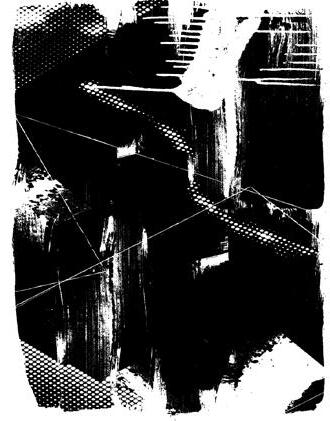




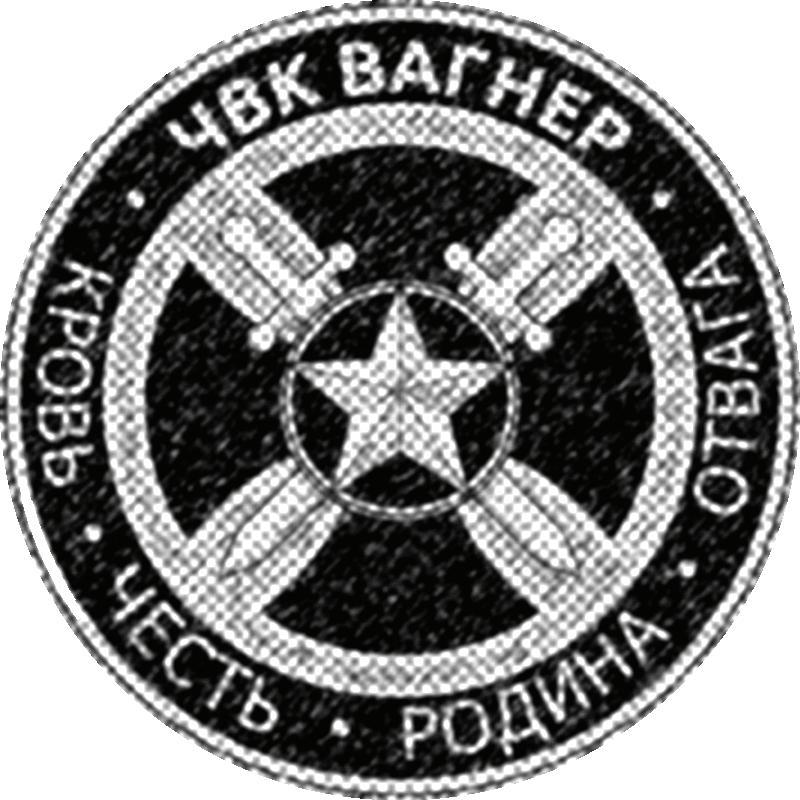
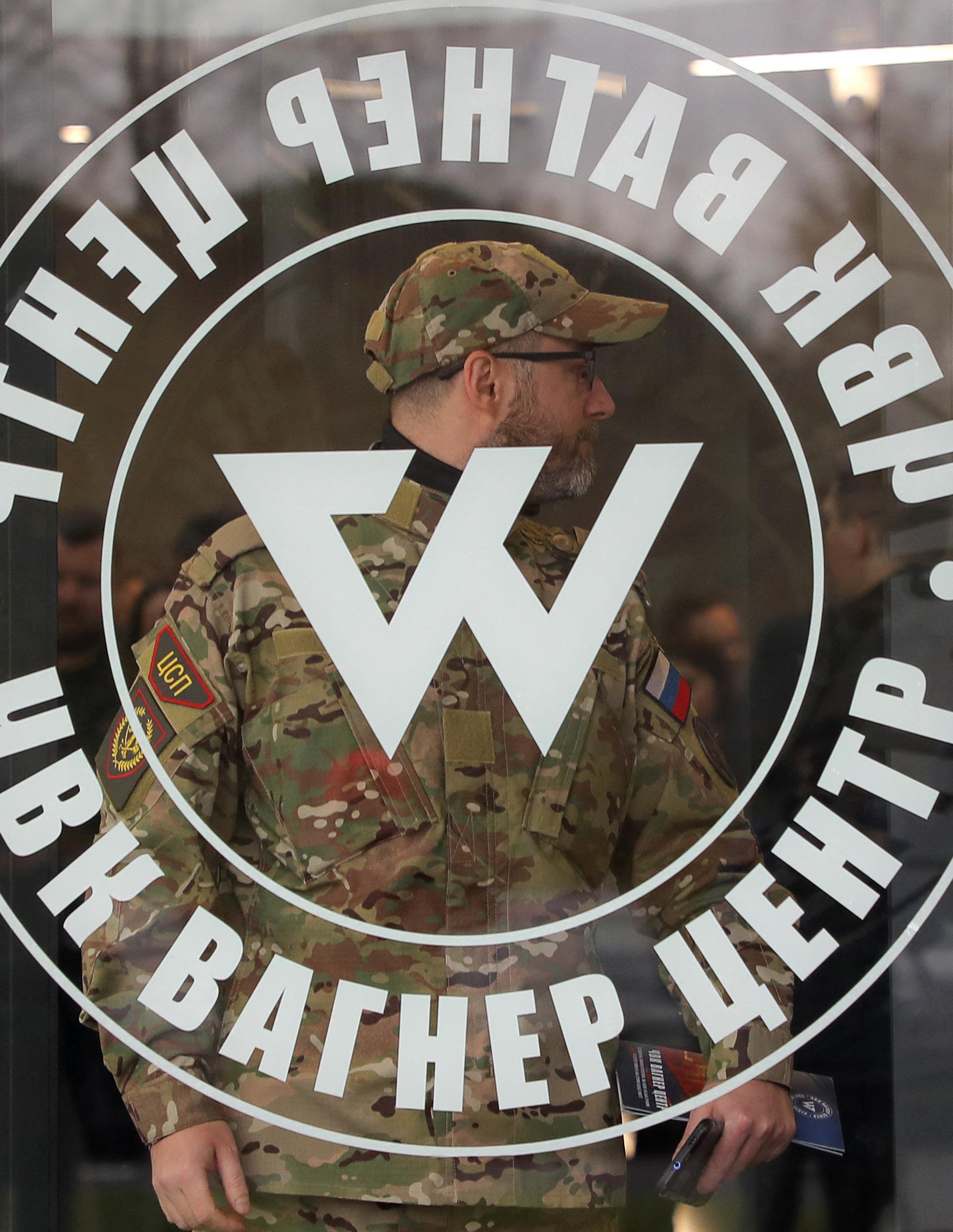 A man wearing a camouflage uniform walks out of PMC Wagner Centre, which is a project implemented by the businessman and founder of the Wagner private military group Yevgeny Prigozhin, during the official opening of the office block in Saint Petersburg, Russia, November 4, 2022. REUTERS/Igor Russak
A man wearing a camouflage uniform walks out of PMC Wagner Centre, which is a project implemented by the businessman and founder of the Wagner private military group Yevgeny Prigozhin, during the official opening of the office block in Saint Petersburg, Russia, November 4, 2022. REUTERS/Igor Russak
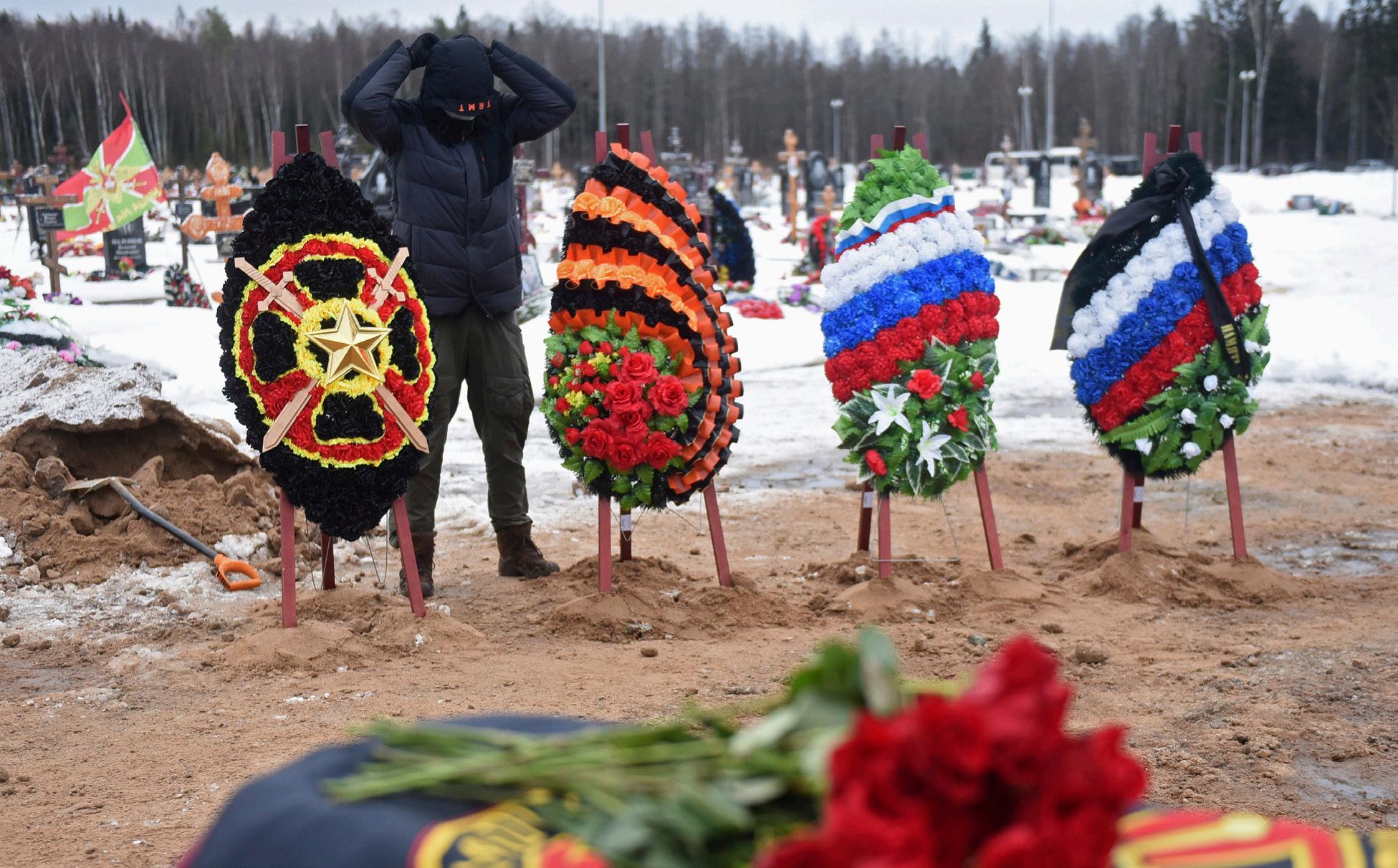
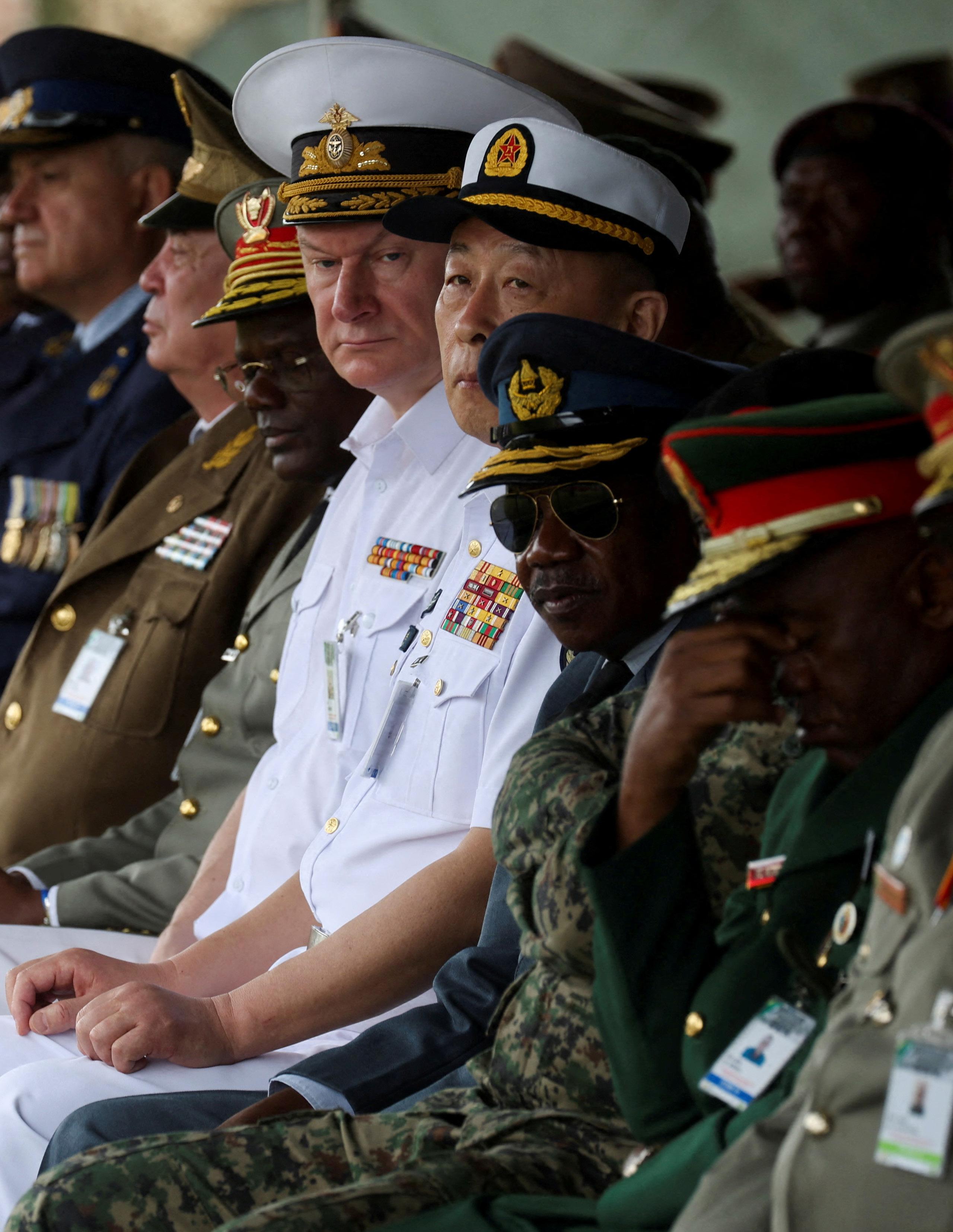 Foreign military officials look on during an Armed Forces Day parade ahead of scheduled naval exercises with Russian and Chinese navies in Richards Bay, South Africa, February 21, 2023. REUTERS/Rogan Ward
Foreign military officials look on during an Armed Forces Day parade ahead of scheduled naval exercises with Russian and Chinese navies in Richards Bay, South Africa, February 21, 2023. REUTERS/Rogan Ward
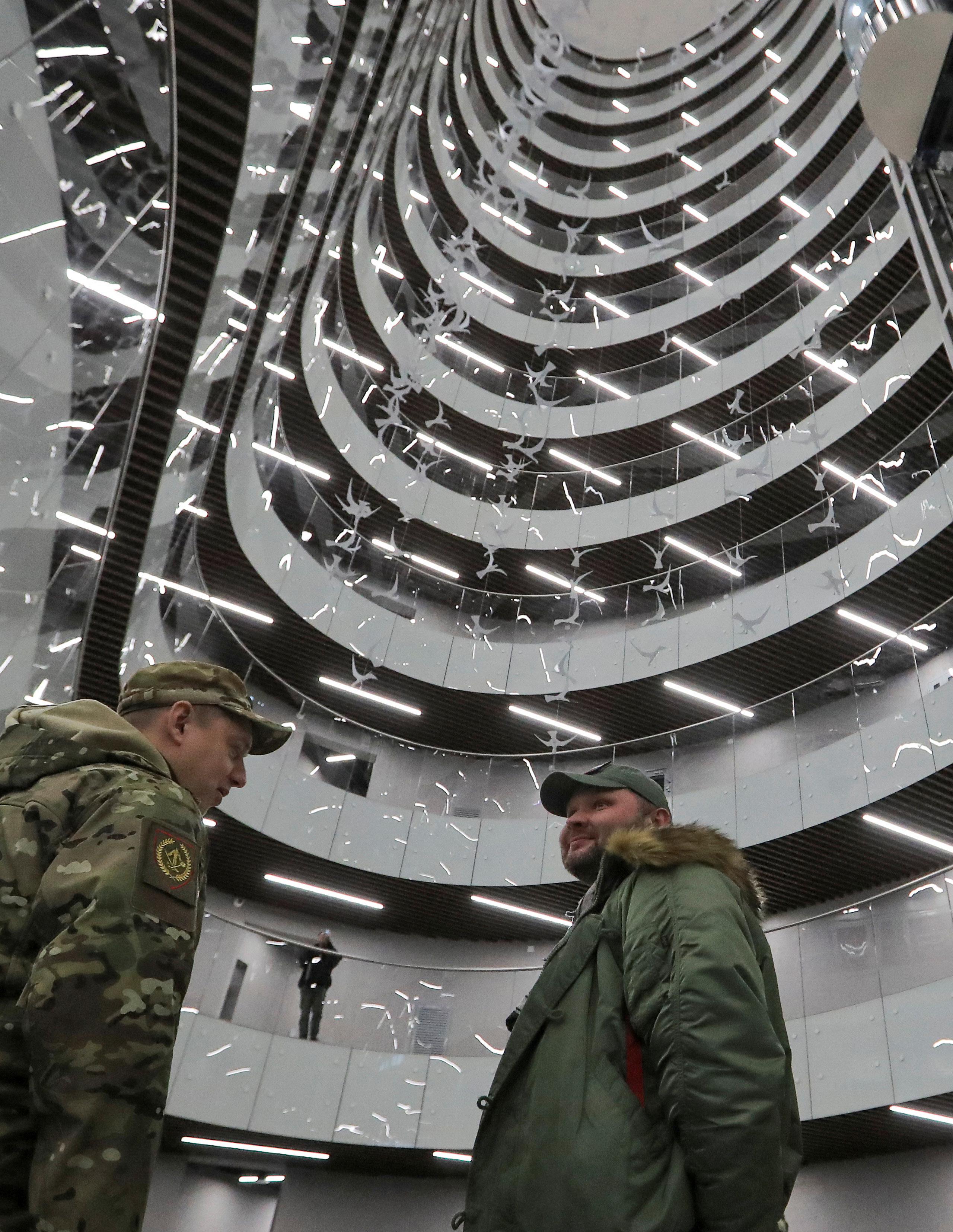 An interior view shows PMC Wagner Centre, which is a project implemented by the businessman and founder of the Wagner private military group Yevgeny Prigozhin, during the official opening of the office block in Saint Petersburg, Russia, November 4, 2022. REUTERS/Igor Russak
An interior view shows PMC Wagner Centre, which is a project implemented by the businessman and founder of the Wagner private military group Yevgeny Prigozhin, during the official opening of the office block in Saint Petersburg, Russia, November 4, 2022. REUTERS/Igor Russak
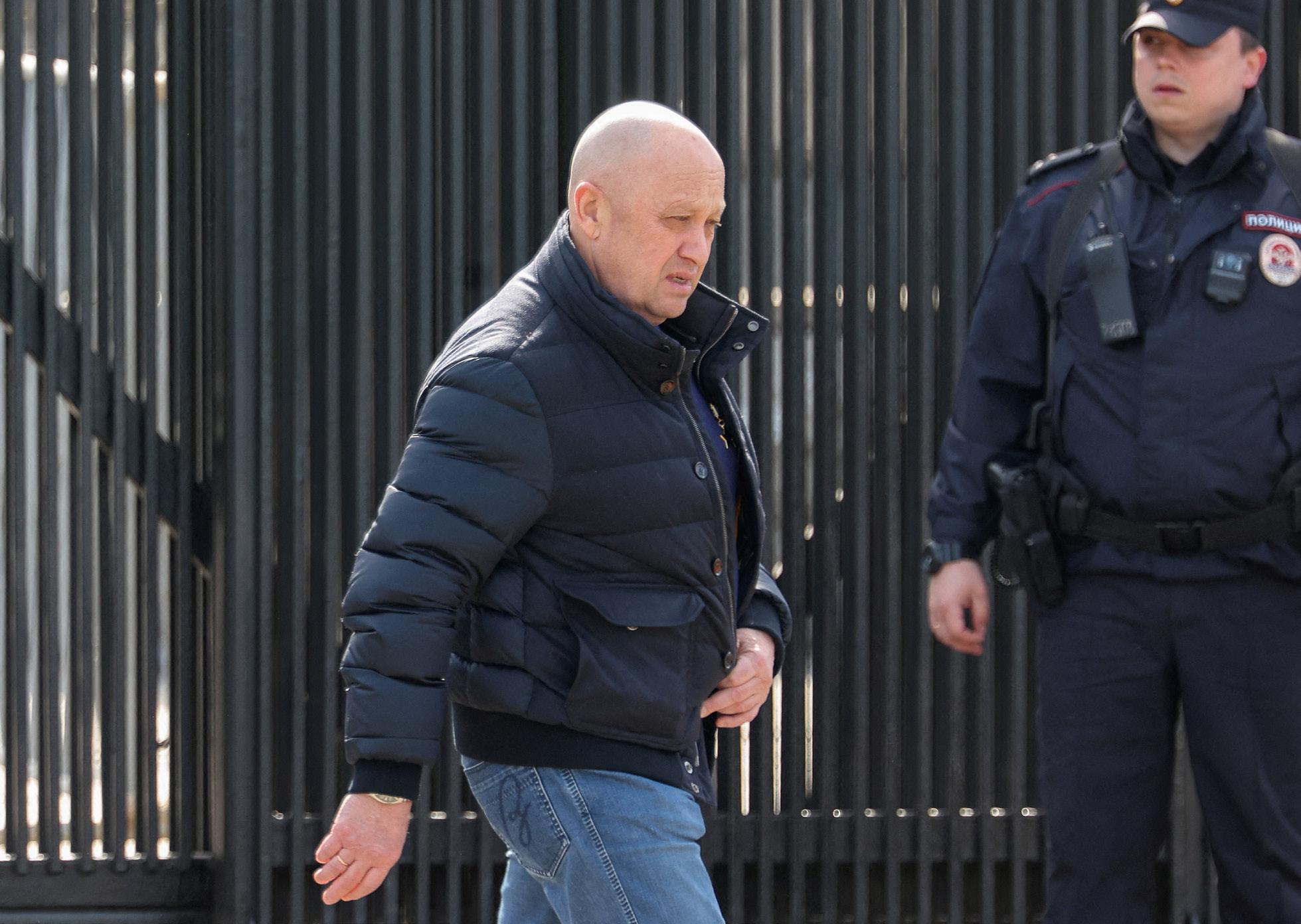
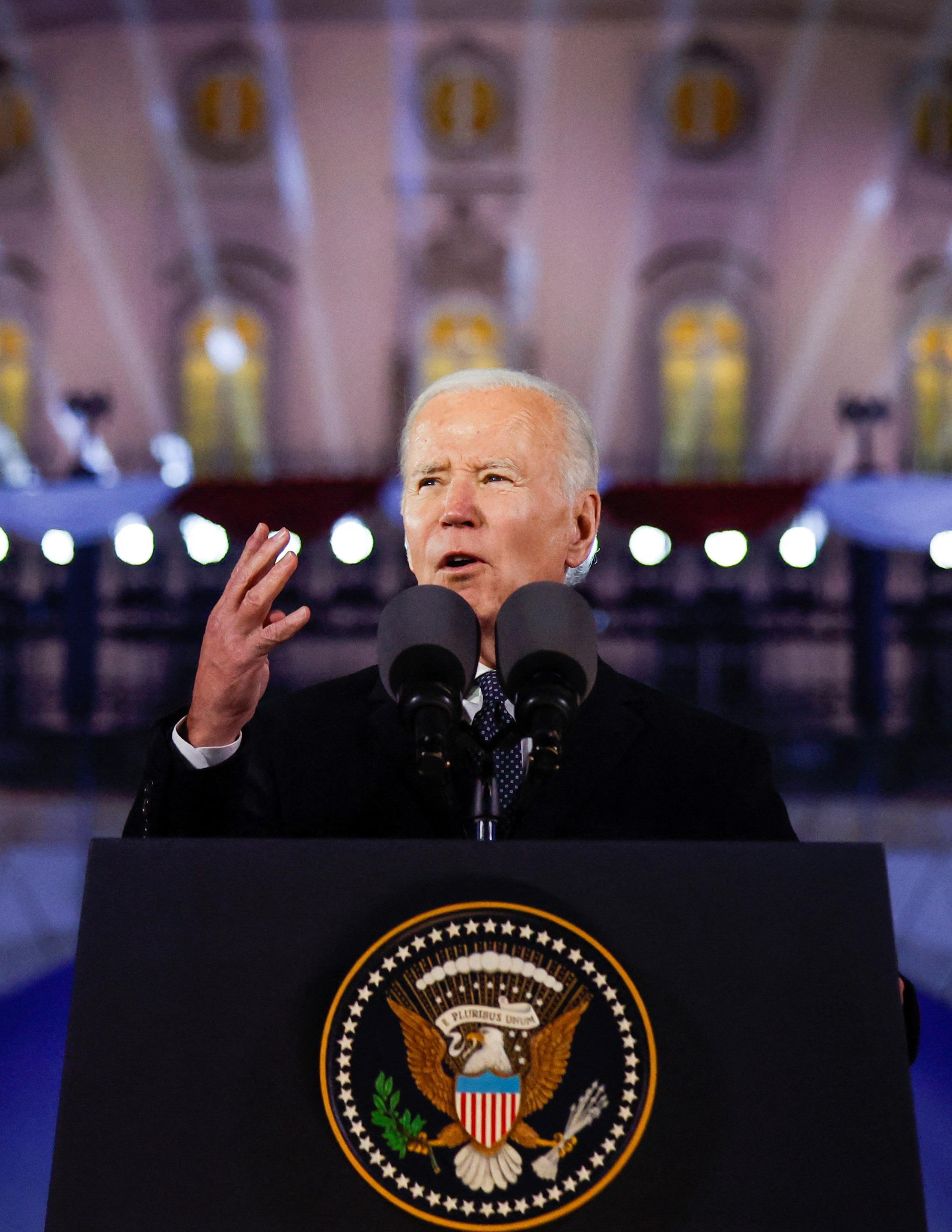 U.S. President Joe Biden delivers remarks ahead of the one year anniversary of Russia's invasion of Ukraine, outside the Royal Castle, in Warsaw, Poland, February 21, 2023. REUTERS/Evelyn Hockstein
U.S. President Joe Biden delivers remarks ahead of the one year anniversary of Russia's invasion of Ukraine, outside the Royal Castle, in Warsaw, Poland, February 21, 2023. REUTERS/Evelyn Hockstein

